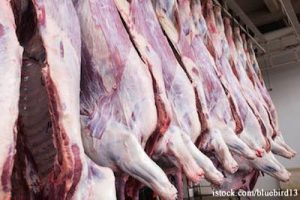Food & Water Watch sent a letter to the USDA to protect U.S. consumers from Australian meat and to re-evaluate the equivalency of that country’s meat inspection system. Meat companies are abandoning the Australian Meat Inspeciton System (AEMIS) that was found to be equivalent to the U.S. system. This is the fifth time in two years that Food & Water Watch has asked the USDA to look at the Australian food safety inspection system.
 Food & Water Watch’s executive director Wenonah Hauter said in a statement, “Although the European Union has flagged definite problems in allowing meat companies to police their own inspection systems, the USDA has yet to speak out about this every obvious conflict of interest. Yet if the result of a privatized meat inspection system in Australia is food that is unsafe to eat, the United States owes it to consumers to revoke the equivalency determination for AEMIS.” AEMIS took most of the inspection responsibilities away from government inspectors and let corporations police themselves, much like HIMP does in the United States poultry industry.
Food & Water Watch’s executive director Wenonah Hauter said in a statement, “Although the European Union has flagged definite problems in allowing meat companies to police their own inspection systems, the USDA has yet to speak out about this every obvious conflict of interest. Yet if the result of a privatized meat inspection system in Australia is food that is unsafe to eat, the United States owes it to consumers to revoke the equivalency determination for AEMIS.” AEMIS took most of the inspection responsibilities away from government inspectors and let corporations police themselves, much like HIMP does in the United States poultry industry.
Australia is the second-largest exporter of red meat and red meat products to the U.S. The United States imported more than 620,000,000 pounds of red meat from Australia in 2013. That figure is expected to increase. Since Australia implemented AEMIS, USDA inspectors have found serious food safety violations, including traces of fecal matter on meat and positive test results for E. coli O157:H7.
An audit of the Australian system posted last month by FSIS concluded that the Australian government wasn’t holding Australian meat companies accountable for the contamination. Some of the problems that were found included that Central Competent Authority (CCA) instructions to in-plant inspection personnel omitted provisions that instruct inspectors to document deviations from critical control points. CCA hasn’t verified that establishments have reassessed their HACCP plans. Sanitation programs have not been assessed, and monitoring of equipment sanitation is inadequate.
Food & Water Watch filed a petition on June 6, 2014 to revoke AEMIS equivalency determination. European Commission auditors concluded in 2012 that there was an inherent conflict of interest when company-paid employees are performing food safety inspections because employees are more likely to be deferential to employers.




